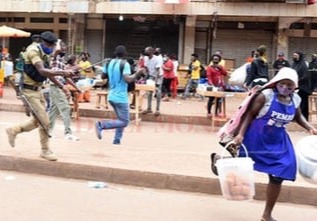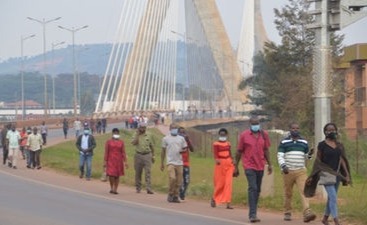Just a few hours from now, I was scheduled to take off for Uganda. By Thursday morning (Kampala time), Scott would meet me at the airport. But all of that has changed.
Last Friday at 10:00 pm Ugandan time, President Museveni announced that he was moving the nation into a FULL LOCKDOWN for 42 days immediately. This was after a partial lockdown announced 2 weeks earlier. I asked some friends, “Why 42 days?” I got back a little bit of insight and a lot of comedy. “It’s one more than 41 and one less than 43” and “it’s Museveni’s magic number.” I’m beginning to agree with Scott’s advice never to ask “why” questions in the developing world.
This lockdown is similar to what Museveni did in early 2020. All public and private vehicle movement is prohibited unless you are a government official, are transporting cargo or have an official “travel pass.” This means most Ugandans now walk everywhere, sometimes 2 hours or more each way to work. Some are getting creative however. The definition of “cargo” is being broadly defined to include entire dump truck loads of … people. A local man was arrested when the ambulance he was driving all over Kampala (with lights and sirens) was searched and 12 passengers were located inside.
Kampala has slowed to a crawl. While the 660 COVID casualties (out of a population of 48 million) are undeniably sad, the lockdown provisions seem broad and haphazard. Ugandans cannot ride as a passenger on a motorcycle taxi but they can work at hotels, restaurants and the airport, if they can get there. Taxis are parked unless they are official “tourist vehicles,” in which case they can travel throughout Uganda at full capacity without restriction. Perhaps the lockdown provisions are related to the fact that many tourist concessions (hotels, lodges, safari companies) are owned by politicians and government officials.
In downtown Kampala, vendors arrived to work at their small businesses Saturday morning only to be driven away by riot police. Some vendors have decided to sleep in their stalls. They are asking the government to supply mosquito nets to prevent malaria as they live away from their families for the next 6 weeks, trying to earn a living.
Scott has access to an “official vehicle” to go to work, but money for fuel and maintenance is scarce, as it comes from the government. There is no clarity concerning the effects on the justice system in Uganda, other than those accused and in prison will not have access to Court, and likely a lawyer, for the length of the lockdown. Even those “emergency” court hearings that do occur will face struggles as staff members may not be able to get to work.
The various situations facing Scott’s Pepperdine team mirror those or ordinary Ugandans. One of Scott’s lawyers lost her mother to COVID about 10 days ago and she traveled 6 hours to her home village to attend to the family. Because the new lockdown rules prohibit travel between districts, even if Esther could find transport, she would be stopped and turned back long before she got close to Kampala. Olive travels to work by boda and faces a 90-minute walk to work. Hassan had a travel pass from the earlier lockdown but the government announced today that those are invalid and any driver caught trying to use one would be arrested, charged and their car impounded. So, Hassan waits for a new travel pass.
The Pepperdine interns live in central Kampala and can walk most everywhere they need to go. But most stores (including grocery stores) are closed and many restaurants shut down at 5 PM or before to enable their employees to get home before the 7:00 pm curfew. At the moment, the interns are working remotely which is a far cry from the experience they anticipated. They essentially left a country coming out of months of COVID restrictions so they could travel to one where even tighter restrictions exist.
Given all of this, we decided to postpone my departure from the U.S. until we get a bit more clarity.
The needs for Ugandans are great right now. The government has announced planned distribution of 55,000 Ugandan shillings (about $13) for every household for food and expenses. That is the equivalent of less than a week of wages for the average Ugandan.
Even more than the financial need, these restrictions are upending life for ordinary Ugandans who were just recovering from the prior restrictions. On Saturday morning, hundreds of Ugandans on foot were blocked from crossing a bridge across the Nile River – the border between 2 districts -- to get back home from their jobs in a neighboring town. The military and police turned them back with threats of arrest and force. Meanwhile packed tourist vehicles moved unmolested through the checkpoints and across the bridge. In other words, ordinary Ugandan mothers and fathers could not get home to their children but oblivious tourists could drive as far as they liked to see a lion or enjoy a spa day at a safari lodge.
We have no idea what’s next. Our hope is that the restrictions, in fact, end after 42 days but there is no certainty of that. In the meantime, we pivot. Scott will get to the prisons with his team when he can. We will see each other again when we can. The interns will work as well as they can. Our job is to trust that God has this and recognize that our inconveniences are insignificant in comparison to the challenges facing most Ugandans -- food, shelter, family and income -- in this very difficult time.
Pray for Uganda – and all those working so hard to fill the gaps for the next 42 days. Or 41. Or …


Commentaires